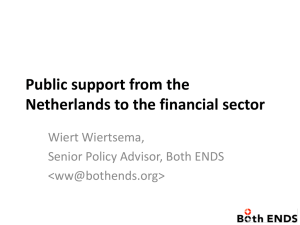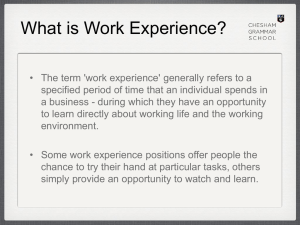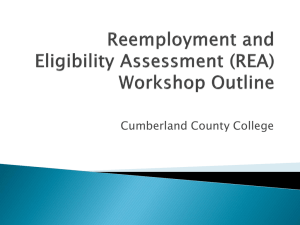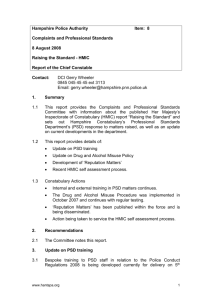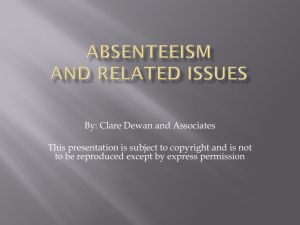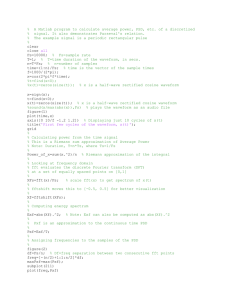preliminary findings
advertisement
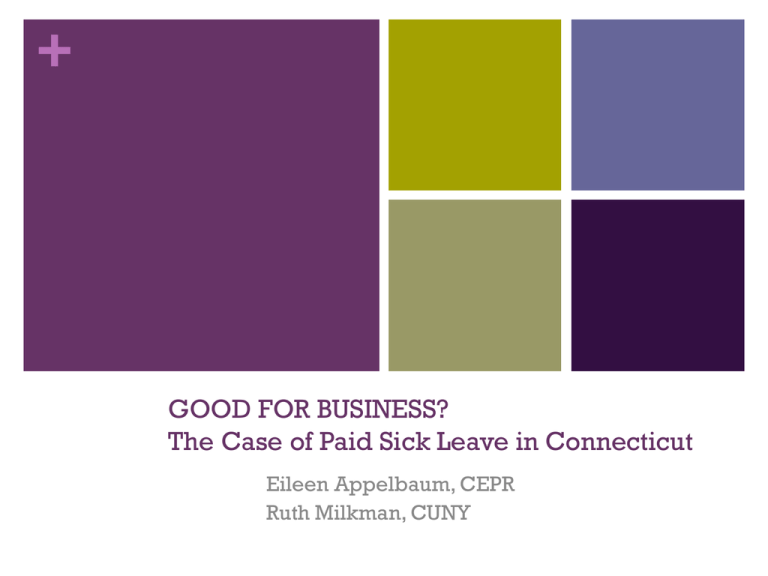
+ GOOD FOR BUSINESS? The Case of Paid Sick Leave in Connecticut Eileen Appelbaum, CEPR Ruth Milkman, CUNY + On July 1, 2011, Connecticut became the first state to require employer-paid Paid Sick Days; law took effect on Jan. 1, 2012 Covers about 400,000 of the state’s 1.7 million employed workers Many carve-outs, including manufacturing and most nationallychartered nonprofits, as well as per diem and temporary workers Covers most non-exempt service sector establishments employing 50 or more workers, including part-time workers Those covered accrue one hour of paid sick leave for every 40 hours they work; can draw on the benefit after 680 hours’ work Can accrue up to 5 days per year Can use leave for own illness, injury, or medical care, for a child’s or spouse, or for care related to family violence or sexual assault The law prohibits employer retaliation against workers who request or use paid sick leave + We surveyed 251 covered CT employers and conducted 15 site visits/interviews with managers Survey: Dun and Bradstreet sample, stratified by employer size Oversampled large establishments 36% response rate (AAPOR RR 3) Interviews with a convenience sample + Businesses concerned about negative impact, but for most, a non-event with minimal burdens Carve-outs limited the impact Employers that already offered paid sick days made minimal or no adjustments Minimal abuse reported (and what little abuse there is was reported before as well as since the law took effect) But coverage did increase: 88.5% of employers surveyed had offered 5+ PSD before the law took effect; by mid-2013, 93.7% did so Number of days offered also rose slightly from an average of 6.9 days prior to the law’s implementation to 7.7 days in mid-2013 + Main Impact on Hospitality, Retail, Health, Education & Social Services + Most workers use fewer Paid Sick Days than available Employer respondents reported that about 2/3 of their workers had used the PSD benefit Of those who did use it, average take up was 4 days (of 7.7 days available on average) in the previous year Half of employers reported that employees used 3 days or less This evidence suggests workers save PSD for when they are really needed, treating the program as a type of insurance + PSD law interacts with “progressive discipline” in unanticipated ways The law’s anti-retaliation provision protects covered workers from discipline for the first 5 days they are absent from work if it is for a purpose covered by the PSD law Employers that punish absences with warnings leading to termination were more likely to report abuse than those without progressive discipline Interesting exception: if progressive discipline was limited to UNEXCUSED absences, less abuse was reported than in cases with no system of progressive discipline + Employer-reported positive effects of PSD law + Most covered the work of absent employees at minimal cost + Minimal cost impact Only 10% of employers reported the law increased payroll costs by 3% or more Biggest cost impact was on employers with lots of part-time workers; indeed the main benefit of the law was to these workers employed in establishments that previously offered PSD only to full-time workers Unionized establishments half as likely to report cost increases as non-union ones Record keeping burden was minimal as well, once system set up to track the benefit. “It’s easy. It takes ten minutes” (nursing home payroll manager) Only 29% of respondents tracked PSD costs separately from other benefits “It would cost us more administratively to track the costs ... No hardship whatsoever!” (entertainment industry HR manager) + Few changes in operations due to increased costs (N=240, multiple responses could be reported ) Operational change Percent reporting Reduced employee hours 10.6% Increased prices 15.6% Reduced operating hours 3.4% Reduced quality of service 1.3% Reduced wages 1.0% + Employer Support for the Law has increased since implementation We heard employers complain about legislators’ lack of understanding of business operations, and various other anti-regulation rants Yet 18 months after the law took effect, most employers surveyed were supportive: 39.5% were “very supportive” of the PSD law 37.0% were “somewhat supportive” Overall: a non-event for employers with real benefits for covered workers, especially parttime service workers

